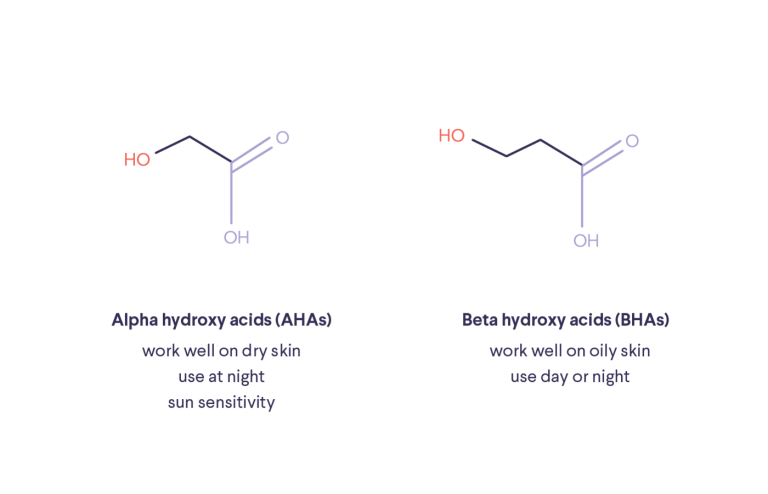How it works:
Share your skin goals and snap selfies
Your dermatology provider prescribes your formula
Apply nightly for happy, healthy skin
How it works:
How it works:
Share your skin goals and snap selfies
Your dermatology provider prescribes your formula
Apply nightly for happy, healthy skin
How it works:
Beta hydroxy acid vs. alpha hydroxy acid
What’s the difference between BHAs and AHAs? Here’s the scoop.



When it comes to deciphering skincare, you don’t need to memorize the Greek alphabet just to figure out what your unique skin needs. At the same time, there are several key differences between AHAs vs. BHAs. You could say alpha hydroxy acid benefits dry skin types, while beta hydroxy acid benefits oily skin types. That said, there are more subtleties between these two types of chemical exfoliation, so you want to make sure you choose the right one for you. Here are the big differences when it comes to BHAs vs. AHAs.
What is BHA?
Beta hydroxy acids (BHAs) are a type of chemical exfoliation that deeply penetrates pores to help clear out debris. While there are a few varieties, the most popular BHA exfoliant is salicylic acid. Fun fact: though most salicylic acid is made synthetically today, it was first extracted from willow bark.
While beta hydroxy acids can help with breakouts, salicylic acid is especially good for oily skin. This is because salicylic acid is oil soluble, which allows it to deeply penetrate through sebum, dislodging any of the gunk that might be clogging your pores. This clarifying action helps avoid the build-up of oil and dead skin cells that can trigger an acne breakout.

Can’t get enough of chemical exfoliation? Read our expert guide.
What is AHA?
Alpha hydroxy acids are superficial exfoliators, meaning they only treat the outermost layer of the skin — which is more tolerable for skin that doesn’t naturally produce a ton of oil. AHAs reduce hyperpigmentation by dispersing melanin and by increasing collagen synthesis. Translation: improved skin tone and a healthier appearance, which is nothing to sneeze at!
It’s important to note, though, that chemical exfoliation isn’t a cure for dry skin, although AHAs can help with signs of dry skin associated with aging such as dullness and flaking. If you have dry skin and want to give them a try, start with a formula with a lower concentration of AHAs, and don’t incorporate it into your daily routine right away. Using an AHA on dry skin once or twice a week is plenty to start.
Common forms of AHA exfoliants include glycolic acid, lactic acid, and mandelic acid. Glycolic acid is the most popular AHA due to its effectiveness. Mandelic acid can help contribute to increased oil production in the skin, which makes it a favorite for people who have dryness associated with aging skin.
No matter which AHA you prefer, it’s recommended that you only use it at night, because they increase our skin’s sensitivity to the sun!

Start your free trial (plus shipping and handling)
Too much of a good thing?
Ready to dip your toes into the world of chemical exfoliation? Then first things first — you should know that over-exfoliation can actually make your skin worse, so keep an eye out. Whether you prefer BHAs or AHAs, you should limit your exfoliation to 1–2 times per week (max), and watch out for these telltale signs that you may be overdoing it:
Redness
A feeling of tightness in the skin
Increased sensitivity/soreness
Skin that looks shiny (but not oily)
Chemical exfoliation may not be for everyone — but that’s okay, because it’s not a skin routine necessity. If you’re new to Curology, you should also give your skin plenty of time to adjust to your prescription skincare before giving exfoliation a try. That said, if you can tolerate it, chemical exfoliation can help improve your skin’s appearance — just give your face plenty of time and space to let those hydroxy acids work their magic!
Take the guesswork out of your skin routine
BHAs and AHAs can be wonderful things, but as we said above, they take a little trial and error before you can tell if they’re for your skin type. In the meantime, if you want to demystify your skin health in a way that takes your needs in mind, custom skincare prescribed by a dermatology provider can help. Sign up for a free trial of Curology and pay just $4.95 to cover the cost of shipping and handling on your first bottle of custom cream or the complete 3-step set, with our non-comedogenic cleanser and your choice of moisturizer.

Curology Team